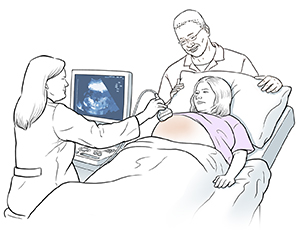A
B
C
D
E
F
G
H
I
J
K
L
M
N
O
P
Q
R
S
T
U
V
W
X
Y
Z
Click a letter to see a list of conditions beginning with that letter.
Click 'Topic Index' to return to the index for the current topic.
Click 'Library Index' to return to the listing of all topics.
Symptoms and Diagnosis of Multiple Pregnancy
What are the symptoms of multiple pregnancy?
Each woman may have slightly different symptoms. But the most common symptoms of multiple pregnancy are:
-
Uterus is larger than expected for the dates in pregnancy
-
More morning sickness
-
Greater appetite
-
Too much weight gain, especially in early pregnancy
-
Babies' movements felt in different parts of the stomach at the same time
How is multiple pregnancy diagnosed?
Many women think they are pregnant with more than 1 baby. The healthcare provider may diagnose multiple babies early in pregnancy. This is especially true if fertility treatments were used. The provider may make the diagnosis with a health history, physical exam, and the following tests:
-
Pregnancy blood testing. Levels of human chorionic gonadotropin (hCG) may be quite high with multiple pregnancy.
-
Alpha-fetoprotein. Levels of a protein released by the fetal liver and found in the mother's blood may be high when more than 1 baby is making the protein.
-
Ultrasound. This is an imaging test that uses high-frequency sound waves to create images of blood vessels, tissues, and organs. Ultrasounds can be done with a vaginal probe (transducer), especially in early pregnancy. Or they can be done with an abdominal probe in later pregnancy.

Online Medical Reviewer:
Donna Freeborn PhD CNM FNP
Online Medical Reviewer:
Heather M Trevino BSN RNC
Online Medical Reviewer:
Irina Burd MD PhD
Date Last Reviewed:
2/1/2023
© 2000-2024 The StayWell Company, LLC. All rights reserved. This information is not intended as a substitute for professional medical care. Always follow your healthcare professional's instructions.